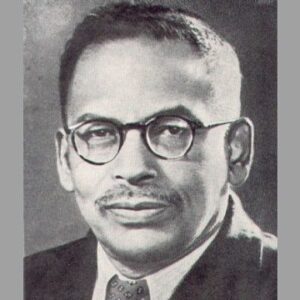Meghnad Saha was a prominent Indian astrophysicist who developed the ionization hypothesis, which described how star spectra form. Meghnad Saha rose from humble origins in a small village to become one of the world’s most renowned scientists of his day. He struggled to receive an elementary education because he was born into a poor family. But the smart and hardworking young man never gave up, and by his unwavering dedication and commitment to science, he soared to the pinnacles of fame and glory. He had the excellent fortune of being trained by prominent academics such as Jagadish Chandra Bose and Prafulla Chandra Ray, which helped him develop as a scientist. He received honors in his college exams and was hired at the University College of Science in Calcutta. He began his research without even having access to a well equipped laboratory or a research guide. Nonetheless, he went on to develop the Saha equation, which is used to describe the chemical and physical conditions of stars.
Childhood and Adolescence
Jagannath Saha and his wife Bhubaneswari Devi had a fifth kid, Meghnad Saha. His father owned a tiny business, and his family was poor. His parents were not interested in schooling their children because of their economical situation.
From a young age, Meghnad showed a strong interest in studies. His parents urged him to stop studying and work in the family shop after completing his primary education.
However, in Ananta Kumar, a local doctor, the kid met a kind Samaritan who promised to support the boy’s schooling in exchange for some modest duties. He moved to Dhaka in 1905 after finishing middle school and enrolling at the Collegiate School.
In 1911, he passed the intermediate test and enrolled at Calcutta’s Presidency College. As a classmate, he met Satyendranath Bose, who went on to become a well-known physicist.
Prafulla Chandra Ray and Jagadish Chandra Bose taught him at college. In 1913, he received his BSc in mathematics, and in 1915, his MSc in Applied Mathematics.
Meghnad Saha’s Career
In 1916, he was hired as a lecturer at the University College of Science in Calcutta’s Department of Applied Mathematics. Satyendranath Bose, a previous classmate, also enrolled at the same university.
Saha and Bose were both reassigned to the physics department, where Saha began lecturing on hydrostatics, spectroscopy, and thermodynamics.
Saha began conducting research in addition to his teaching duties. He immersed himself in research despite the fact that the college lacked an experimental research facility.
He submitted a substantial essay on ‘Selective Radiation Pressure’ to the Astrophysical Journal for publication in 1917. However, he was told that it could only be published if he paid a percentage of the publishing costs. He couldn’t afford it due to a lack of finances. However, the publication published a brief notice on his research.
In 1919, he received his Doctor of Science degree from Calcutta University. During the same year, he was awarded the Premchand Roychand Scholarship for his dissertation on the “Harvard Classification of Stellar Spectra.”
He published four papers in the Philosophical Magazine in 1920 about his astrophysics studies. He developed his Thermal Ionization theory, which he addressed in these works. In 1920, he received the Griffith Prize from Calcutta University for his thesis.
He moved to Europe for two years to deepen his research after winning the Premchand Roychand Scholarship. He traveled to Berlin to work in Walter Nernst’s laboratory after spending some time in London with Alfred Fowler.
In 1923, he enrolled at the University of Allahabad, where he stayed for the next 15 years. During this time, he rose to prominence in astrophysics, eventually becoming president of the Indian Science Congress Association’s physics division in 1925.
He became a physics professor at the University of Calcutta in 1938. He took a number of moves, including incorporating nuclear physics into Calcutta University’s MSc physics curriculum, launching a post-MSc degree in nuclear science, and pursuing the construction of the country’s first cyclotron.
He was a wonderful scientist, but he was also a tremendous institution builder. In 1935, he started the Indian Science News Association in Calcutta, and in 1950, he founded the Institute of Nuclear Physics. He is also credited for creating the Damodar Valley Project’s original plan.
His Major Projects
The Saha ionization equation, which related the ionization state of an element to temperature and pressure, is Saha’s most significant contribution to the area of astrophysics. The spectral categorization of stars is explained using this equation.
Personal History and Legacy
In 1918, he married Radharani, and the couple had three boys and three daughters. One of his sons was also appointed to the Institute of Nuclear Physics as a professor.
On February 16, 1956, he died of a heart attack.
Years later, astronomer Jayant Narlikar paid respect to Saha, saying that his ionization equation was a great achievement in twentieth-century Indian science, deserving of a Nobel Prize.
Estimated Net worth
Meghnad is one of the wealthiest and most well-known celebrities. Meghnad Saha’s net worth is estimated to be $1.5 million, according to Wikipedia, Forbes, and Business Insider.


